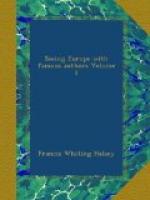The most favorite object of curiosity, however, is Shakespeare’s chair. It stands in the chimney-nook of a small gloomy chamber, just behind what was his father’s shop. Here he may many a time have sat when a boy, watching the slowly-revolving spit, with all the longing of an urchin; or, of an evening, listening to the crones and gossips of Stratford, dealing forth churchyard tales and legendary anecdotes of the troublesome times in England. In this chair it is the custom of everyone who visits the house to sit: whether this be done with the hope of imbibing any of the inspiration of the bard, I am at a loss to say; I merely mention the fact; and mine hostess privately assured me that, tho built of solid oak, such was the fervent zeal of devotees, that the chair had to be new-bottomed at least once in three years. From the birthplace of Shakespeare a few paces brought me to his grave.... We approached the church through the avenue of limes, and entered by a Gothic porch, highly ornamented with carved doors of massive oak. The interior is spacious, and the architecture and embellishments superior to those of most country churches. There are several ancient monuments of nobility and gentry, over some of which hang funeral escutcheons, and banners dropping piecemeal from the walls. The tomb of Shakespeare is in the chancel. The place is solemn and sepulchral. Tall elms wave before the pointed windows, and the Avon, which runs at a short distance from the walls, keeps up a low perpetual murmur. A flat stone marks the spot where the bard is buried. There are four lines inscribed on it, said to have been written by himself, and which have in them something extremely awful. If they are indeed his own, they show that solicitude about the quiet of the grave which seems natural to fine sensibilities and thoughtful minds:
“Good friend, for Jesus’ sake, forbeare
To dig the dust inclosed here.
Blessed be he that spares these stones,
And curst be he that moves my bones.”
The inscription on the tombstone has not been without its effect. It has prevented the removal of his remains from the bosom of his native place to Westminster Abbey, which was at one time contemplated. A few years since also, as some laborers were digging to make an adjoining vault, the earth caved in, so as to leave a vacant space almost like an arch, through which one might have reached into his grave. No one, however, presumed to meddle with the remains so awfully guarded by a malediction; and lest any of the idle or the curious, or any collector of relics, should be tempted to commit depredations, the old sexton kept watch over the place for two days, until the vault was finished, and the aperture closed again. He told me that he had made bold to look in at the hole, but could see neither coffin nor bones; nothing but dust. It was something, I thought, to have seen the dust of Shakespeare.




